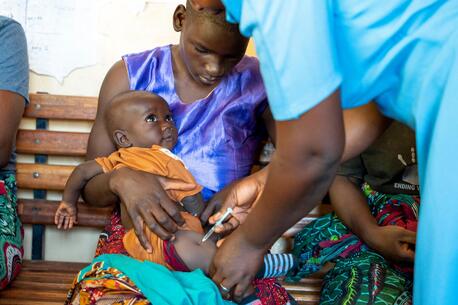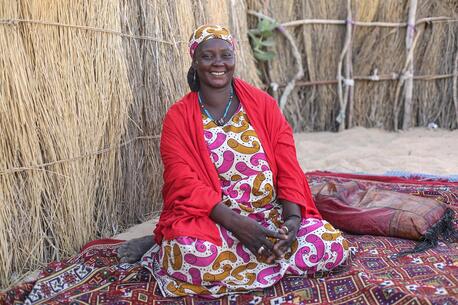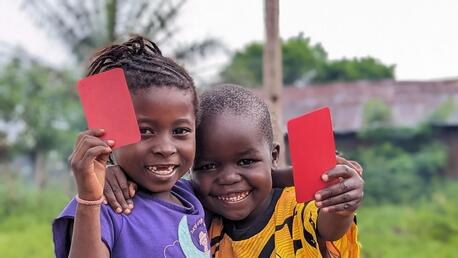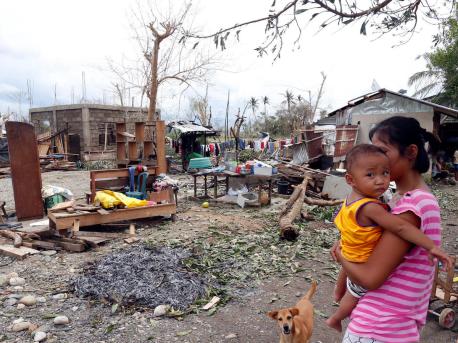
UNICEF and Prudential Financial Team Up to Build Global Resilience
With a focus on catalytic investment and innovative strategic planning, Prudential is pioneering ways to strengthen communities through humanitarian and development work.
In the days after Typhoon Mangkhut battered the Philippines in September, an estimated 1.5 million people — half of them children — struggled to assess the damage and resume their daily lives. Winds up to 177 miles per hour tore off roofs, felled trees, and triggered landslides and extensive flooding, killing more than 100 people. But the country was spared the mass devastation caused by Typhoon Haiyan five years ago.
This time around, thanks in large part to disaster risk reduction measures put in place before the storm hit, a full-scale catastrophe was averted. Supplies had been prepositioned and a wide-reaching messaging campaign warning the public of the impending storm encouraged a record number of people to evacuate before it was too late. Improved construction methods and materials cushioned buildings from the storm's impact. Local officials trained in disaster response coordinated assistance to the most vulnerable and helped avert the widespread looting that followed Haiyan.
Disaster risk reduction saves lives
As climate change exacerbates the disastrous effects of tropical storms, preparing for emergencies is becoming ever more vital to protecting sustainable communities. Prudential, a leading global financial services company founded more than 140 years ago to provide opportunities for all to achieve financial security, is at the forefront of disaster risk reduction. Working in partnership with UNICEF USA since 2006, Prudential has pioneered innovative responses to humanitarian emergencies that lay the foundation for a better future and longterm development programs designed to reduce infrastructure damage and mortality.
#OmpongPH: Children and families at an evacuation centre in Brgy. Pancian, Pagudpud, Ilocos Norte. Children are the most vulnerable in any emergency situation. #Mangkhutpic.twitter.com/nFHSH8OQzu
— UNICEF Philippines (@unicefphils) September 14, 2018
"Like UNICEF USA, Prudential Financial is committed to helping all children, particularly those who are most vulnerable," says UNICEF USA President & CEO Caryl M. Stern. "They understand that, in a world where war, mass migration and climate change threaten more children than ever before, robust humanitarian response can set the stage for long-term resilience. Since 2006, Prudential's support at the nexus of emergency response and sustainable development — and combining impact investments, philanthropic dollars and workplace giving — demonstrates the company's vision and leadership in global development."
Rethinking humanitarian response and development work
Prudential's multi-level support of UNICEF's humanitarian work around the world, totaling more than $36 million since 2006, has helped save children's lives and build resilience in countries and regions as diverse as Mexico, Brazil, Nigeria, Pakistan, Liberia, Nepal, the Caribbean, Syria and neighboring countries. By enabling UNICEF's rapid, lifesaving humanitarian responses in countries suffering from natural or manmade disasters, Prudential also supports UNICEF's development initiatives, which empower communities to prevent, mitigate and withstand emergency.
Our partnership with UNICEF and UNICEF USA epitomizes our intent to employ a multi-tiered strategy of global impact. — Lata Reddy, Prudential's Senior Vice President, Diversity, Inclusion and Impact and Chair and President of The Prudential Foundation
"Our partnership with UNICEF and UNICEF USA epitomizes our intent to employ a multi-tiered strategy of global impact," says Lata Reddy, Prudential Senior Vice President, Diversity, Inclusion and Impact and Chair and President of The Prudential Foundation. "With UNICEF's unparalleled reach and presence in more than 190 countries and territories, its programming expertise and its strong relationships with governments and partner NGOs, it represents a critical partner and collaborator. As the needs of the world's children grow, we look forward to finding new ways to save lives and build resilience together."
Preparedness and resilience
Prudential's support of preparedness and resilience takes many forms, including the production of training and advocacy videos, volunteer efforts to build disaster-resilient homes, analysis of disaster- and conflict-associated risks, a comparative study of the impact of disasters on children's welfare in India and Kenya, and three case studies on disaster risk reduction in India focusing on community preparedness, school safety and local and state government planning.
After participating in a Prudential-sponsored disaster risk reduction workshop in 2017, Youssouf Abdel-Felil, UNICEF USA Representative in Vietnam, said, "This opportunity took place at a very strategic moment for us in the post-response to the drought and saltwater intrusion crisis and recent engagement in the Typhoon Damrey response. The workshop helped us focus on a systems-building approach and address climate change-related risks across the board in our programming."
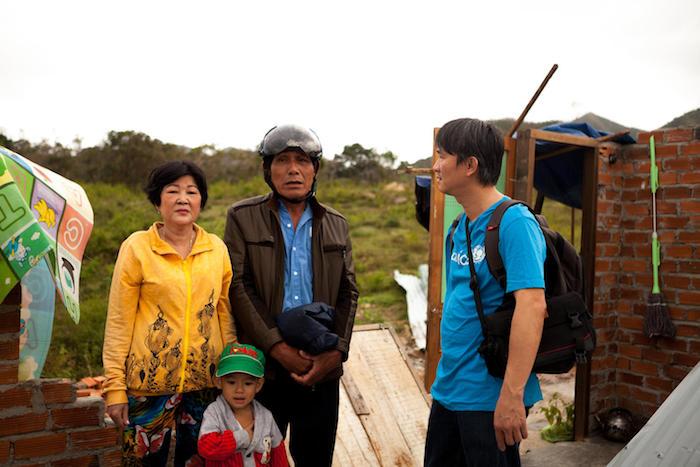
In Vietnam, a UNICEF emergency response staff member visits a family whose house blew away in Typhoon Damrey in 2017. © UNICEF/UN0145642/
Prudential's catalytic investment dollars fuel UNICEF USA's Bridge Fund
Vulnerable children often need help before financing commitments are fulfilled and the cash is secured. In 2011, Prudential's catalytic investment dollars helped UNICEF USA create a vehicle to solve this problem — allowing UNICEF to speed lifesaving assistance to children around the world. Among other programmatic focuses including education and disaster relief, UNICEF USA's Bridge Fund has been particularly critical for immunization programs, ensuring vaccine procurements can happen on time, never delayed by a lag in funding.
When it comes to the resiliency of communities, vaccines are one of the most medically efficacious interventions there are. Currently, immunization averts between 2 million and 3 million deaths every year. Global initiatives to eradicate polio and maternal and neonatal tetanus (MNT) have played a vital role in saving those lives.
To date, the Bridge Fund has provided more than $150 million in accelerated financing to support polio and MNT immunization initiatives. MNT, for example, requires three injections, and timing is critical. In December 2017, the Bridge Fund advanced $1.5 million to Guinea (a country still recovering from the 2014 Ebola outbreak) to enable the swift purchase of MNT vaccines and supplies, ensuring that women in their childbearing years could receive their vaccinations on schedule and immunization would be effective.
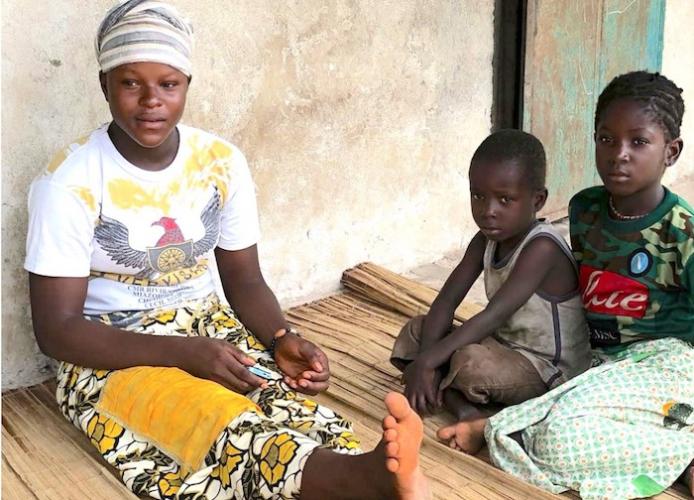
Aïssata, left, lost her first baby to maternal and neonatal tetanus (MNT) in Tambayah, Guinea. UNICEF and partners are launching a massive MNT immunization campaign in Guinea, aiming to provide more than 3 million women with the first, crucial round of vaccinations. © UNICEF/UN0122364/Moreno Gonzalez
Prudential's support for the Mercury Fund allows UNICEF to respond swiftly to catastrophic events
The first crucial days after an emergency hits can mean the difference between life and death for children. To address funding gaps in humanitarian crises, UNICEF USA created the Mercury Fund. The resources in this fund activate in under 72 hours to respond to the growing and pressing needs of children, often before a crisis or the complexity of an emergency hits the news. Prudential is the private sector champion of UNICEF USA's Mercury Fund, providing UNICEF with a rapid and accessible pool of resources. The Mercury Fund has been successful in swiftly responding to catastrophic events around the world including the needs of Rohingya refugees in Bangladesh and of migrant children in Central America.
How emergency response can promote sustainable development
"Addressing urgent humanitarian crises is, in fact, a better way to achieve lasting, long-term development," says UNICEF Executive Director Henrietta H. Fore. "By investing in the needs of the children of emergencies — their health, their protection, their education — we are investing in the future of their societies. In short, we cannot achieve a sustainable tomorrow if we fail to serve the needs of children and young people today."
By investing in the needs of the children during emergencies — their health, their protection, their education — we are investing in the future of their societies. — Henrietta H. Fore, UNICEF Executive Director
For example, UNICEF is fostering long-term development needs when it launches immunization campaigns during emergencies — after war, insecurity, drought, monsoons or earthquakes may have disrupted routine immunization, damaged health care systems and/or forced children and their families from their homes.
Safeguarding communities before, during and after emergencies
In 2015, Prudential's support of UNICEF's emergency response and preparedness programs helped UNICEF reach more than 807,000 people with cholera vaccination, including 309,000 children after Hurricane Matthew struck Haiti. Prudential also helped provide 670,000 doses of cholera vaccine to adults and children trapped in the Rohingya refugee crisis, and helped enroll 974,000 Syrian children in formal education, either in refugee camps or among host communities in the region.
Building on this momentum, UNICEF and Prudential will continue to serve and protect the needs of children living through protracted, hidden and brutal crises. Prudential's support of longterm development will help children and families prepare for and survive disaster and crises by advancing disaster risk reduction measures, ensuring a safe and clean environment for every child and building systems for peacebuilding. This year, as a part of its humanitarian response, UNICEF plans to connect 8.9 million children with access to basic education, 10 million children with immunizations for measles and 35.7 million children with safe water.
After Hurricane Matthew struck Haiti in 2015, funding from Prudential helped UNICEF reach more than 807,000 people with cholera vaccination.
Every child deserves a future
Mobilizing employees for social good is another pillar in Prudential's corporate social responsibility plan. Since 2006, Prudential has become one of UNICEF USA's top five workplace giving partners, helping UNICEF respond to 10 humanitarian emergencies and reach more than 3.6 million children.
Prudential offers a powerful, multi-level model of corporate responsibility that aligns perfectly with our own commitment to put children first around the world. — Gabriella Morris, UNICEF USA Senior Vice President for Strategic Partnerships
"We look forward to continuing our partnership with Prudential because they believe, as we do, that every child — no matter who they are or where they live— deserves a future," says Gabriella Morris, UNICEF USA Senior Vice President for Strategic Partnerships. "We also share a commitment to measuring real progress for kids and collaborating on creative ways to tapping new sources of funding for their welfare. Prudential offers a powerful, multi-level model of corporate responsibility that aligns perfectly with our own commitment to put children first around the world."
Photo at top: Working together, Prudential and UNICEF implemented disaster risk reduction measures to strengthen communities before Typhoon Mangkhut hit. On September 16 in the Northern Philippines province of Cagayán, a mother holds her 1-year-old son outside the ruins of their home. © UNICEF/UN0236645/Maitem
